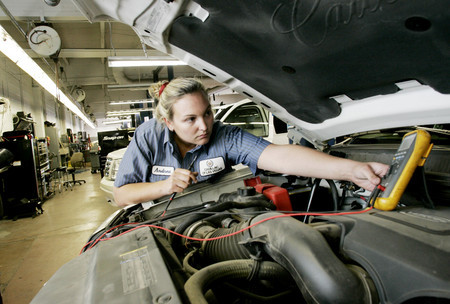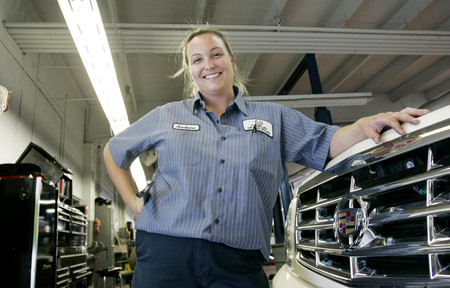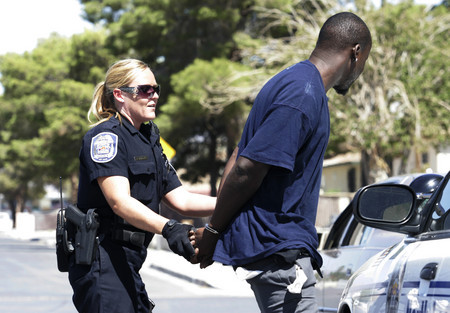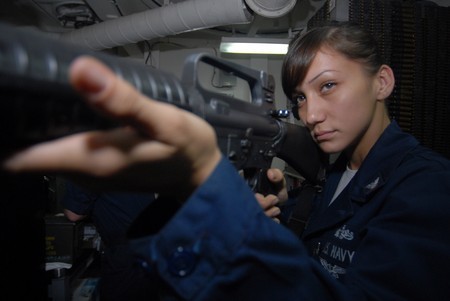Females are thriving in traditionally male jobs
Two men sit in a parked tan Cadillac with no rear license plate. North Las Vegas police officer Kathryne Buehler, 29, approaches the driver's window, no trace of the bubbly personality she displayed while being interviewed in her squad car.
"Sir, place your hands on the steering wheel!" she commands.
The driver does not comply. Buehler repeats herself two more times before removing him from the vehicle and cuffing him.
"If it needs to get physical, I'll get physical," Buehler says afterward. "All the females in this department, we've earned our respect. We don't have any girls in our department who don't deserve to be here."
Valley women who perform what are traditionally considered male jobs report that gender is less of an issue than ever in the workplace.
"I can do everything a man can do," says Jacqueline Carrizosa, 19, speaking from off the coast of Pakistan aboard the USS Ronald Reagan aircraft carrier. "And I can do a lot of things better than some of them can."
In 1995, President Clinton signed legislation opening many combat jobs to women, which is why you'll find this Shadow Ridge High School graduate training .50-caliber machine guns on potential enemies in the Gulf of Oman.
Women make up 25 percent of the ship's 270-member weapons department, and 20 percent of its 4,500 sailors. And Carrizosa reports zero discrimination on the firing line or below decks.
"They may get annoyed if I do things better than them," she says, "but they get over it."
This perceived shift in acceptance owes to more of the world being run by people raised in the '70s and '80s -- by the first generation of moms who found it socially acceptable to leave the kitchen.
"There are more models available for people," says S. Charusheela, associate professor of women's studies at the University of Nevada, Las Vegas. "I think it's being reinforced in a variety of other ways, too, such as by television shows like 'Law & Order,' where people actually see women in positions of authority."
"This ain't 'The Brady Bunch' anymore," agrees Andrea Campoverde, an auto mechanic at Cadillac of Las Vegas East.
Compoverde, 31, has seen a "significant change" in acceptance even since she entered the business in 1994. At that time, one older male manager told her that female mechanics did not deserve equal pay and announced his intention to reduce Campoverde's.
"He actually said that to my face," Campoverde recalls.
Campoverde, who was eight months pregnant at the time, complained to the manager's assistant, who went over his head to their supervisor. That supervisor was a woman, and Campoverde's paycheck was never reduced.
"It's almost at a point where gender's not an issue now," Campoverde says.
Alida Delponte, 56, who directs casino operations at Sunset Station, says that being the right person for a casino management job these days has nothing to do with which restroom you use.
"Smart women are all over the industry now," she says, "women with business degrees, marketing degrees, financial degrees."
This was far from the case in 1984, when Delponte -- then a Circus Circus dealer -- attempted to enter management.
"There were plenty of women dealers," she says. "We were the eye candy behind the table. But I don't know that it ever occurred to the guys (in charge) that we might one day want to do more than deal."
Delponte eventually rose to vice president of casino operations for the MGM Grand, but says that rising took significantly longer for her than for many similarly qualified -- and even some less-qualified -- men.
"They would just jump, jump, jump," she says. "I had to go from dealer to the floor, to a pit manager, to assistant shift manager, to shift manager to vice president -- every single level."
Jackie Love, 44, says the hard battles were all fought by her female predecessors at the Las Vegas Fire Department.
"Women who paved the way before me, they would probably say they see a big change," says Love, who joined the department 13 years ago. "But I don't personally see one. We've never run into a fire and went, 'Oh, here comes the female, she won't be able to do it.' "
Of course, there are physical barriers for women competing in certain traditionally male occupations. Buehler admits she's less capable than most of her male counterparts of overpowering a large male suspect with brute strength.
"We're not the same as men," she says. "No matter how much in our mind we think we are, physically we're not. So we have to approach things differently."
For instance, Buehler -- who stands 5 foot 4 inches and weighs 130 pounds -- says that women frequently fare better at de-escalating situations that "men and their egos" cannot. Likewise, Love -- who stands 5 foot 6 inches and weighs 135 pounds -- reports doing a better job in confined spaces.
"You can't have the firefighter getting stuck and now you have two people to rescue," she says. "So they send the smallest, shortest person in -- and that's usually me."
Despite the change in perceived attitudes, the female ranks in traditionally male valley jobs have not all increased accordingly. The number of women employed by the Las Vegas Fire Department has risen from 4 percent to 6 percent since 1997, when Love joined. Since Buehler joined the North Las Vegas Police Department in 2004, female representation has actually slipped -- from 13 percent to 10 percent. And, according to the U.S. Census, 2 percent of the valley's 8,774 mechanics were female in 2008.
"It's a complicated issue," says Charusheela, noting that discrimination can be institutional -- not just the overt kind prohibited by law.
"The difficult question is what ends up making people not apply for certain jobs," she says. "It may be that some women don't want to be auto mechanics. But we also find, in interviews, that people don't apply for jobs that they believe they're not going to get."
Contact reporter Corey Levitan at clevitan@reviewjournal.com or 702-383-0456.




















